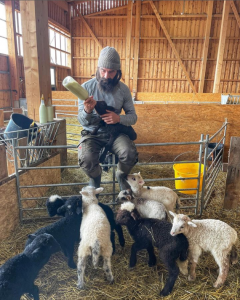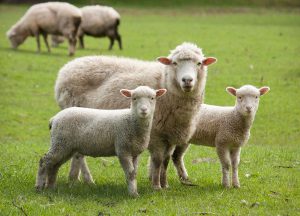
photo by Claire Jeannerat
In recent times, the farmers of Great Britain have had a lot of bad press. Many would have us believe that British farms are, in the majority, characterised by huge, faceless, production line style agriculture. However, many farmers are still carrying on their craft in the traditional way, not so far removed from the farmers and shepherds in Jesus’ time.
Like those in first century Palestine, I know of a number of shepherds and shepherdesses who live at close proximity with their flock at certain times of the year. For one it’s important that she’s in her caravan in the fields during lambing time, so that she can be on hand to help twenty-four seven. For another, during the summer months when they are on the mountain plateaus, he lives in his shepherd’s hut on the hillside to keep a close watch. That same shepherd leads his 300 or so sheep on a 40 mile trek every year to reach the summer pastures, not pushing and harassing from the back but leading from the front with the sheep following the one whom they know and trust.
These types of farmers know their sheep. They know their lineage, their genetics and their issue, through generations. They know those who are prone to ailments or difficult births, where they’re hefted, who are the escape artists, the risk-takers, and the slowcoaches.
They too, despite what some sections of the media would have us believe, want their livestock to have an abundant life.
Jesus describes himself here as the gate who allows the shepherd and the sheep to come and go. A few verses on, he’ll say that he is shepherd, whom he has said “calls the sheep by name and leads them out”, “goes ahead of them”, and who “they follow because they know his voice”.
The sheep know the shepherd, they listen to the shepherd, and they follow the shepherd.
I would suggest that that is vocation. To know, listen to, and follow God.
Our realisation of our vocation relies on our knowing God. Knowing God’s loving character, compassionate nature, desire for justice and the redemption of all things. It also relies on knowing who we are in God – what character and desires God has created within us. And both of these are active knowing’s: they involve effort, energy, the giving of time and attention. Vocation relies on knowing God.
The next part of vocation is listening. We do a lot of listening not with our ears. Relying on video and telephone calls through the pandemic made us really aware of how much we rely on our other senses to interpret and understand people in conversation. We rely on our eyes, our sense of touch, and our intuition, when we converse with other people. Which is good because I have never audibly heard the voice of God! But I do know that by watching the world around me, listening to and weighing what is said by others, along with reading the Bible, and even sitting in the silence of prayer, somehow, I hear God. I hear God in those nudges to the conscience, those convictions of the heart, those fleeting thoughts that come as if from nowhere. God is speaking all the time, and the sheep are those who listen.
And finally: following. When you know God and who you are in him; when you’ve listened and heard the promptings and suggestions; the only option left is to follow. Sometimes that’s a tiny step, sometimes it’s a giant leap. In either case, you know that you are stepping into the loving arms of a Good Shepherd, of the one who came that we may have life and have it abundantly.
Vocations come in all shapes and sizes. Really the possibilities are endless. In the church they can look like a calling to licensed or ordained ministry, to lending your expertise on a board or committee at provincial and diocesan level, to being part of the stewards, coffee, or intercessions rotas. Buildings and gardens need management and tending, outreach initiatives need instigators and sustainers, children and young people need mentors and guides, everything needs people of prayer to underpin and gird it. We all have vocations to things outside of church too: to our families or our neighbourhoods; to jobs or voluntary roles; to a particular way of running a business. Vocations can change, stop, and start anew. You can have more than one!
Whatever it may be: know God and who God says you are. Listen, actively and intentionally. If God is speaking, it’s time to follow. Living in step with God like this is the way to abundant life.

Christ is the gate who opens the way.
God is the good shepherd who calls us by name.
And the Lord is our Shepherd. We shall not want. He makes us lie down in green pastures. He leads us beside still waters. He restores our soul. He leads us in right paths for his namesake. And even though we walk through the darkest valleys we need fear no evil. For God is with us to comfort and anoint. To offer the way to life that is abundant.






